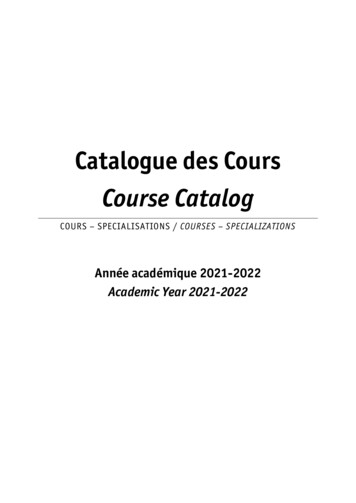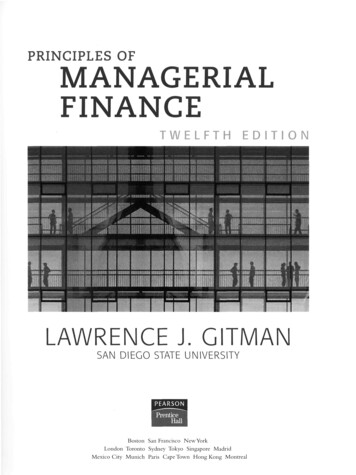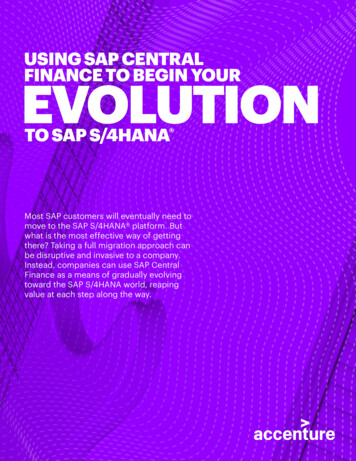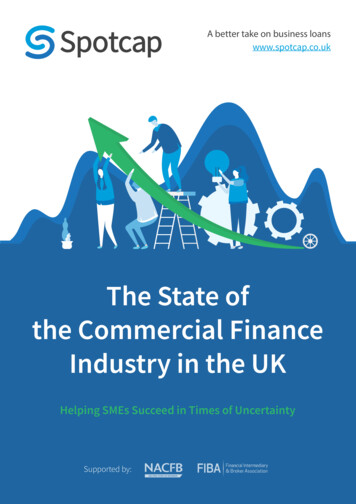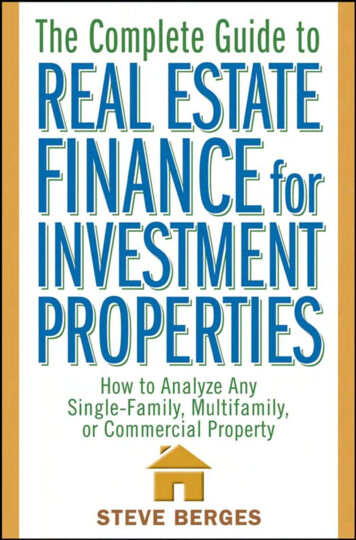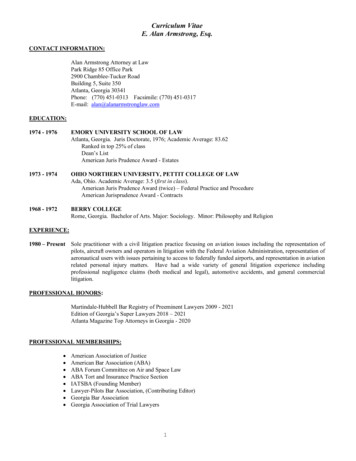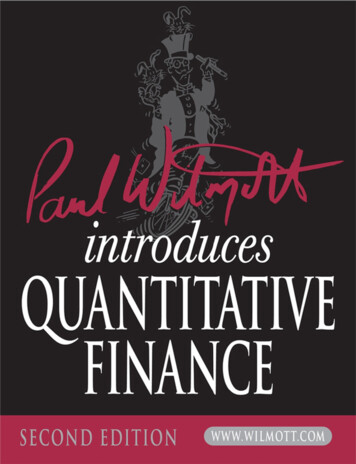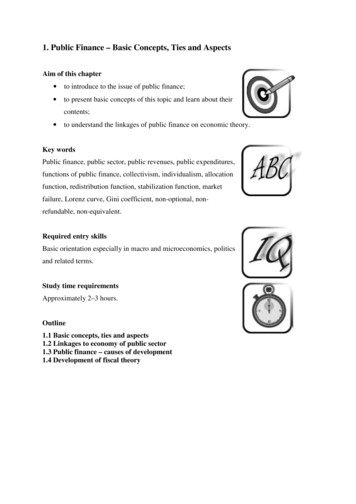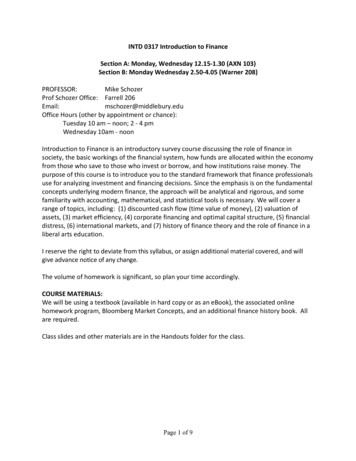
Transcription
INTD 0317 Introduction to FinanceSection A: Monday, Wednesday 12.15-1.30 (AXN 103)Section B: Monday Wednesday 2.50-4.05 (Warner 208)PROFESSOR:Mike SchozerProf Schozer Office: Farrell 206Email:mschozer@middlebury.eduOffice Hours (other by appointment or chance):Tuesday 10 am – noon; 2 - 4 pmWednesday 10am - noonIntroduction to Finance is an introductory survey course discussing the role of finance insociety, the basic workings of the financial system, how funds are allocated within the economyfrom those who save to those who invest or borrow, and how institutions raise money. Thepurpose of this course is to introduce you to the standard framework that finance professionalsuse for analyzing investment and financing decisions. Since the emphasis is on the fundamentalconcepts underlying modern finance, the approach will be analytical and rigorous, and somefamiliarity with accounting, mathematical, and statistical tools is necessary. We will cover arange of topics, including: (1) discounted cash flow (time value of money), (2) valuation ofassets, (3) market efficiency, (4) corporate financing and optimal capital structure, (5) financialdistress, (6) international markets, and (7) history of finance theory and the role of finance in aliberal arts education.I reserve the right to deviate from this syllabus, or assign additional material covered, and willgive advance notice of any change.The volume of homework is significant, so plan your time accordingly.COURSE MATERIALS:We will be using a textbook (available in hard copy or as an eBook), the associated onlinehomework program, Bloomberg Market Concepts, and an additional finance history book. Allare required.Class slides and other materials are in the Handouts folder for the class.Page 1 of 9
TEXTBOOK:Fundamentals of Corporate Finance, Ross, Westerfield, Jordan, McGraw-Hill/Irwin, 11th editionWe will be using the related online homework program, Connect Finance, McGraw-Hill/Irwin.The unique Connect Finance website for this course are:Section ntd-317-spring-2016-section-aSection ntd-317-spring-2016-section-bYou must go to this website and register to do the assigned homework (see below). There areseveral ways to get the textbook and access to the online homework system: New hardcover book: it comes bundled with an access code that you can use to registerwithout an additional charge. DO NOT LOSE THE ACCESS CODE. Hard cover book withConnect Plus ISBN 9781259418952, which also provides full access to the ebook. Or looseleaf format with Connect Plus ISBN 9781259407727 (this will be in the bookstore).E book: e book with connect homework Connect Plus code card (for purchase inbookstore): ISBN 9781259289392. Also available through McGraw Hill website. There arevariety of supplemental learning tools and materials online.If you buy the ebook standalone and want a hard copy book as well:o Generally, buying a current edition used text and then buying Connect Plus (which isrequired and which includes the ebook) separately is more costly than a new book.o If you buy an old edition of the hard copy text, you may be able to get that text andthe ebook for less than the new text. You remain responsible for the material in theedition we are using in the course (edition 4)o If you purchase the ebook and want a hard copy, there is a loose-leaf versionavailable.Additional Required Reading:Capital Ideas: The Improbable Origins of Modern Wall Street, Peter L Bernstein, Wiley,ISBN-13: 978-0471731740Note: there is no homework or papers assigned related to this book, but you can expectone or more final exam essays drawn from it.CALCULATOR:You will want a calculator with financial functions such as the HP 12C, HP 10BII , or TIBA II Plus.Page 2 of 9
BLOOMBERG MARKET CONCEPTS (BMC):We will be using BMC as part of the class. BMC can be accessed for free from the Bloombergterminals in the library. There are four modules: Economics, Currencies, Fixed Income andEquities. BMC is a combination of video and questions, using the Bloomberg terminal for dataand analysis. It is designed as for 6 total hours, more or less 1.5 hours / module. Bringheadphones to the Bloomberg for the video component.With BMC, you will learn to use over 30 Bloomberg functions. The system also includes anexam component, which is part of your grade.There are only two Bloomberg terminals in the library, so plan your work accordingly and wellin advance of the deadlines. You can work ahead on BMC, which is strongly suggested.In order to sign in (see instructions below), you will need to enter the following access codes: Section A: INTD0317ASection B: INTD0317BUse your Middlebury email as your login. There are no extensions on the BMC system (I cannotoverride the system), so get the work done in advance. If you miss the due date, you will stillbe able to access the system but your grade will be zero.STUDY RESOURCES:On Handouts are posted the following additional materials: cross reference guide from book to online homework problemsanswers to the concept questions and problems other than those assigned ashomework at the end of each chapter.As study tools, you have access both to these resource plus, once the due date has passed, yourcan continue to access the homework problems online which will include the solutions.COURSE SCHEDULE: Lectures: presentation and/or discussion of material One mid term will be during a Thursday evening exam session. That week, there will beno Wednesday class.COURSE CONDUCT:The course will be presented in a combination of lectures, class discussion, and class problemsolving. Bring paper, pencil and calculator to class. We will follow normal standards ofprofessional and business conduct, which include the: Class starts on time. No late arrivals. Computers use is not permitted in class.Page 3 of 9
No phones or texting in class.These standards will be strictly adhered to.GRADING:Mid term examFinal examParticipationHomework – Connect onlineBMCFinal GradeAAB BBC CCDF% 939086838076737060035%35%5%20%5%% 100939086839076737060COURSE REQUIREMENTS:You are expected to prepare for each class. This means you must read the assigned material,and do the self-study review problem in each chapter. Preparation prior to class is alsoimportant to a worthwhile experience in this course. If you are falling behind or notunderstanding the material, it is your responsibility to come to office hours.ASSIGNMENTS:Chapter reading: Reading the chapters assigned before class is required. This includes theappendices where assigned. You should do the examples in the book as you read. The SelfStudy Review Problem at the end of each chapter is an important review of that chapter.Homework Problems: The online homework is accessed through Connect Finance websitedescribed above. The access dates are set in the system so you must complete the work by11.50 pm on the due date as required. There is no penalty for multiple attempts; the systemwill tell you whether your answer is correct. Each student has the same question with differentnumbers, and you are encouraged to work together. Solutions are available online the dayafter the due date. The questions are the same as the problems in the book (with differentnumbers) and a list of the book problems is in the course Handouts folder (the systemrenumbers the questions online). There will be no extensions for homework; the lowestPage 4 of 9
homework grade will be dropped.Bloomberg Market Concepts: This is independent work. At each login, you will be asked tocertify adherence to the honor code. There are 4 sections, each of which has a quiz associatedwith it. The due dates are shown below. Access is described below.Capital Ideas: In addition to the textbook, you will also read Capital Ideas during the semester.It tells about the history of finance theory and how the practice of finance interacted withtheoretical developments. Professor Colander will discuss this book in a lecture during the lastweek of class, but we encourage you to read the book early in the semester, since it providescontext for some of the models you will be learning.EXAMINATIONS:Examinations may include both conceptual questions and numerical problems. The mid termand final are not cumulative. The final will include one or more essays drawn from Capital Ideas.ACADEMIC INTEGRITY:The College exists primarily to sustain the pursuit of knowledge. Scholarship, teaching andlearning are possible only in an environment of academic integrity characterized by honesty andmutual trust. Simply expressed, academic integrity requires that one’s work be one’s own. Everymember of the College community - students, faculty and administrators - has the responsibilityto insure that the highest standards of academic integrity are maintained.STUDENTS WITH ACCOMDATION REQUIREMENTSStudents with documented disabilities who need accommodation should contact StudentAccessibility Services to ensure such accommodations are implemented in a timely manner.Please contact Jodi Litchfield at litchfie@middlebury.edu or 802-443-5936.Page 5 of 9
Notes:Connect homework assignments are designated below as “HW”BMC section due dates are noted as “BMC”DateChapterHomeworkHomework DueFeb 15Introduction to Corporate Finance (reading RWJ Chapter1)BMC EconomicsMar 2Feb 17Review: financial statements (reading RWJ Chapter 2)HW 2Feb 28Feb 22Review: ratios (reading RWJ Chapter 3)HW 3Mar 3Feb 24Long Term Financial Planning (reading RWJ Chapter 4)HW 4Mar 6Feb 29Time value of money, PV and FV (reading RWJ Chapter 5and section 6.1 of Chapter 6)HW 5Mar 10Mar 2Time value of money, DCF (reading RWJ Chapter 6)Mar 7Time value of money, DCF (reading RWJ Chapter 6)HW 6Mar 17Mar 9International Corporate Finance (reading RWJ Chapter21)BMC CurrenciesMar 14Mar 14International Corporate Finance (reading RWJ Chapter21)HW 21Mar 24Mar 16Interest rates and bonds (reading RWJ Chapter 7)BMC FixedIncomeMar 24Mar 21Interest rates and bonds (reading RWJ Chapter 7)HW 7Mar 31Mar 23No classMar 24Thursday evening mid termMar 28BreakMar 30BreakApr 4Stock valuation (reading RWJ Chapter 8)HW 8Apr 14Apr 6Net present value and other investment criteria (readingRWJ Chapter 9)HW 9Apr 17Apr 11Capital markets history (reading RWJ chapter 12)HW 12Apr 21Apr 13Security market line (reading RWJ chapter 13)HW 13Apr 24Page 6 of 9
Apr 18Cost of capital (reading RWJ chapter 14)Apr 20Cost of capital (reading RWJ chapter 14)Apr 25Raising capital (reading RWJ chapter 15)Apr 27Financial leverage (reading RWJ chapter 16)May 2Financial leverage (reading RWJ chapter 16)May 4Dividend policy (reading RWJ chapter 17)May 9Prof Colander lecture: The History and Future of FinanceMay 11Prof Colander lecture: Finance and the Liberal ArtsMay 19-24final examsPage 7 of 9HW 14May 1BMC equitiesMay 11HW 15May 5HW 16May 8HW 17May 15
Note: we are using the Bloomberg terminal only, not the web versionPage 8 of 9
Page 9 of 9
Section B: Monday Wednesday 2.50-4.05 (Warner 208) PROFESSOR: Mike Schozer Prof Schozer Office: Farrell 206 Email: mschozer@middlebury.edu Office Hours (other by appointment or chance): Tuesday 10 am - noon; 2 - 4 pm Wednesday 10am - noon Introduction to Finance is an introductory survey course discussing the role of finance in
